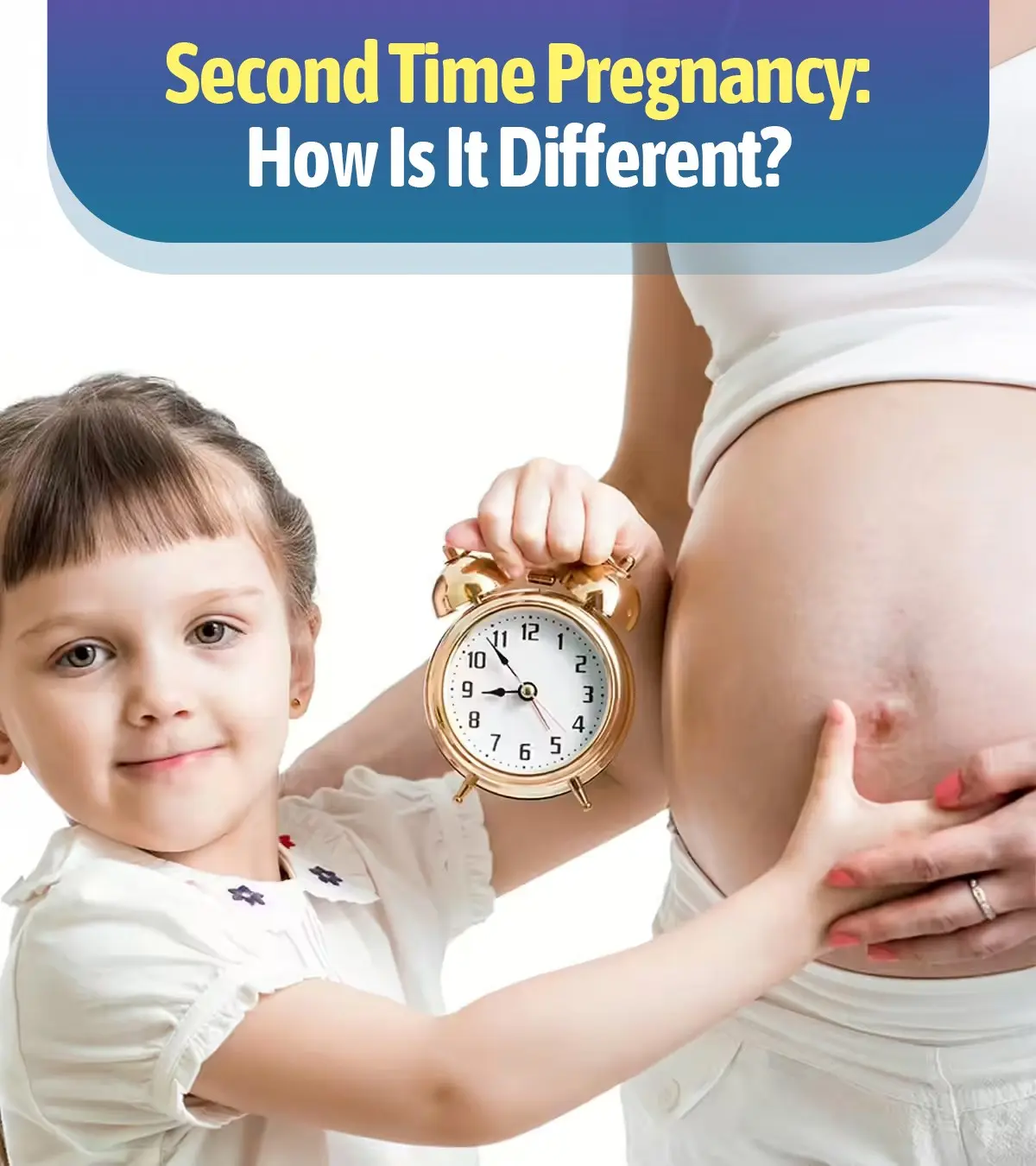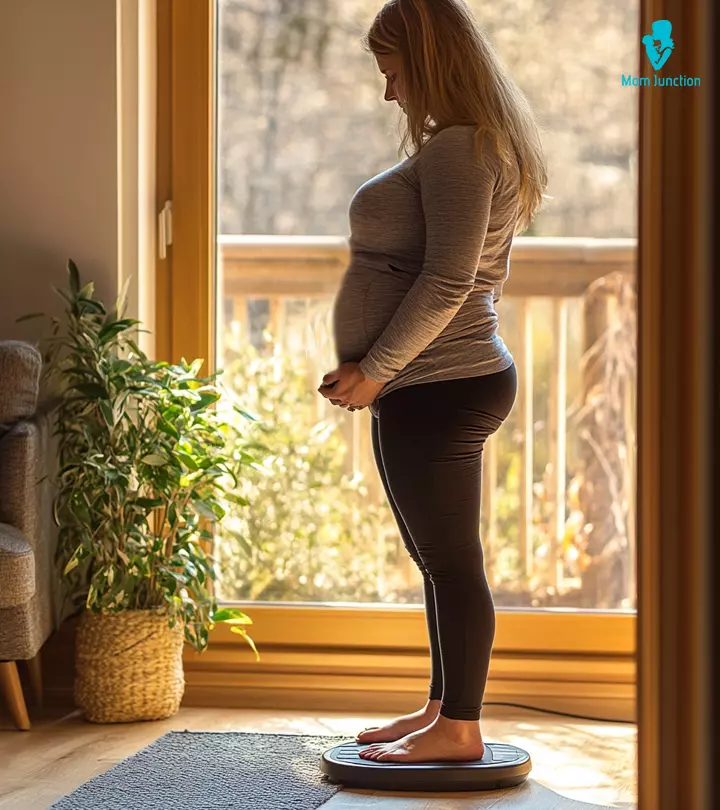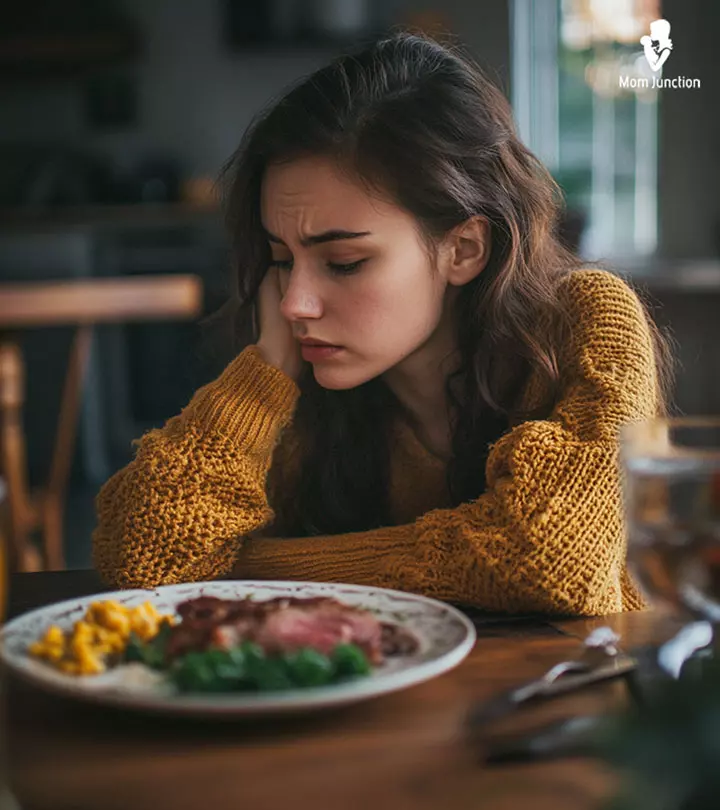
Image: Midjourney/ MomJunction Design Team
Recovery after a miscarriage needs 360-degree care. In addition to emotional support, a woman needs physical nourishment and healing foods. As the body becomes vulnerable after a pregnancy loss, it is critical to understand what foods to eat after a miscarriage and what foods to avoid. A miscarriage can cause heavy bleeding and dizziness. It can also cause weakness. Therefore, you must take certain precautions after miscarriage to recover quickly, which includes watching what you eat. Read on as we tell you about the essential foods to eat after a miscarriage as well as the ones to avoid.

Key Pointers
- A woman requires emotional and physical support after a miscarriage, along with adequate nutrition.
- It is important to know which foods to eat and avoid post-miscarriage for recovery and prevention of future miscarriages.
- Foods high in iron and calcium, such as beans, nuts, lentils, fruits, and vegetables, should be consumed.
- Foods low in fiber starches, sweets, fatty milk, and raw meat must be avoided after a miscarriage.
Best Foods To Eat After Miscarriage
The food you eat during this time impacts your health greatly. Here are some healthy and energy-boosting foods you should consume after a miscarriage to ensure optimal recovery.
1. Iron-rich foods
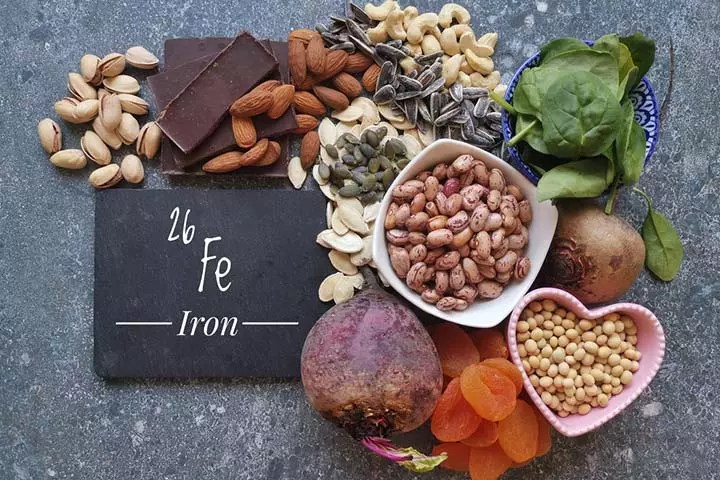
As mentioned before, a miscarriage can cause heavy bleeding (1). That can cause depletion in the amount of iron in your body. You may even experience anemia and other symptoms of iron deficiency due to your miscarriage. Feelings of weakness and fatigue are common after a miscarriage (2).
The best kind of iron to consume after a miscarriage is heme-ironiIron obtained from plant sources. . It is the kind of iron that is easily absorbed by the body. Lean meat, eggs, fish, and shellfish are good sources of heme iron. It helps restore the iron that may be lost during bleeding and supports healing (3). That is why it is important to consume iron-rich foods after a pregnancy loss. So consume red meat in plenty after a miscarriage. But remember to cook it well. Avoid frying it. You can grill it instead.
Other sources of non-heme iron includes:
- Beans
- Green leafy vegetables
- Brussels Sprouts
- Raisins
- Lentils
- Dried Peaches
- Pumpkin Seeds
- Soybeans
- Sesame butter (Tahini)
- Brown Rice
- Dark Chocolate
- Molasses
Apart from consuming these iron-rich foods, try consuming foods that are rich in vitamin C. These vitamin-rich foods can help in better absorption of iron by the body. Fruits, including lemon, oranges, papaya, strawberries, and grapefruits, should be a part of your post-miscarriage diet (4).
 Experts say
Experts say2. Calcium-rich foods
During pregnancy, your body’s calcium reserves can plummet (5). Calcium-rich foods aids in restoring bone density, supports the function of nerves and muscles, and promotes overall health during the recovery process (6). That is why it is important to consume foods that are rich in calcium. Experts recommend consuming atleast two servings of calcium-rich food a day in the recovery phase after a miscarriage (3). Some of the best sources of calcium are:
- Milk
- Dairy products
- Seafood like salmon and sardines
- Dried fruits
- Soya
- Dark green leafy vegetables
3. Feel-good foods
Mourning the loss of a baby can plunge you into depression. It is not easy to make peace with the loss of dreams and hopes. The feeling of depression varies among women. Some women can bounce back pretty easily after a miscarriage while others can mourn for months and even years. No matter the category you fall in, you are a survivor. How you deal with your loss is nobody else’s business. But you can consume some comfort food to help deal with post-miscarriage depression.
You can consume foods rich in magnesium to recover from depression. A lack of magnesium can harm nerve cells, potentially resulting in depression. Research suggests that low magnesium levels, along with high calcium intake and stress, may lead to symptoms such as anxiety, confusion, irritability, fatigue, insomnia, headaches, hallucinations, delirium, and heightened excitability (7).
Consume foods rich in magnesium to recover from depression (7). Some of the foods you can try are (8):
- Legumes
- Nuts
- Plain chocolate
- Cocoa powder
- Potatoes with skin
Magnesium not just helps you deal with depression but also helps your body’s energy production, cell repair as well as nerve and muscle functions.
4. Fruits and vegetables
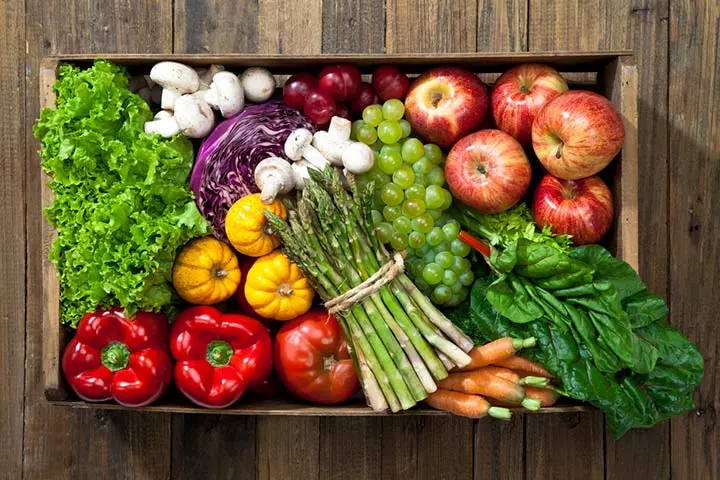
You also need to consume ample amounts of fruits and vegetables to get the nutrients your body needs after a pregnancy loss. They provide essential vitamins, minerals, and antioxidants for overall healing and immune support.
5. Folate rich foods
In the case of a miscarriage, folate, a crucial type of vitamin B, is critical for tissue healing and the formation of new red blood cells. Some of the folate-rich foods that you can try include (9):
- Spinach
- Liver
- Asparagus
- Brussels sprouts
6. Protein-rich foods
Protein is essential for tissue repair and recovery after a miscarriage. It provides vital amino acids that support the body in healing (10). Some protein-rich foods you can include in your diet are:
- Bone broth
- Meat
- Fish
- Poultry
The suggestions mentioned here are for informational purposes only and cannot replace professional medical advice. Consult a healthcare provider for personalized advice.
Foods To Avoid After Miscarriage
A healthy diet doesn’t just mean consuming nourishing food. It also means saying no to food that is not good for your body! Read further to learn about what foods to avoid after a miscarriage:
1. Low-fiber starches

Carbohydrates provide your body with the fuel it needs and also controls your body’s sugar levels. But refined grains or low-fiber starches can have an adverse impact on your body. They can cause rapid fluctuations in your body’s sugar levels (11). That is why it is important to limit the amount of low fiber starch in your diet. Avoid foods like:
- Instant rice
- Egg
- Noodles
- Pretzels
 Quick fact
Quick fact2. Sweets
Avoid sugary foods with a high glycemic index as they too can cause fluctuating blood sugar levels (11). Say no to foods like:
- Candies
- Sodas and carbonated drinks
3. Fatty milk and meats
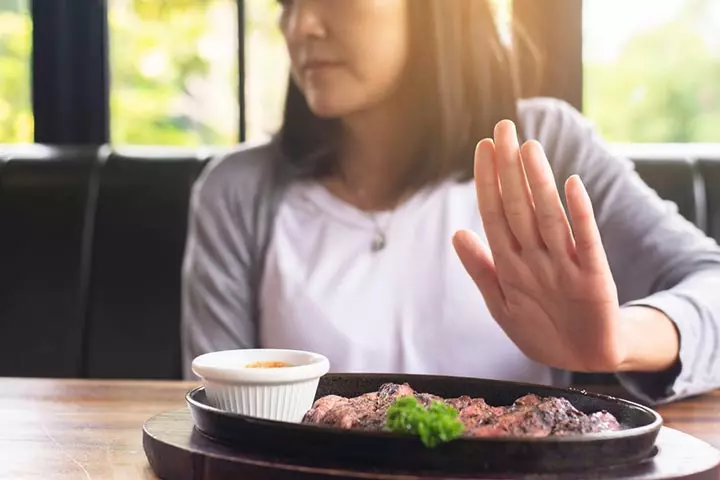
After a miscarriage, it is important to avoid inflammation that can cause you pain and discomfort. The fats in meat and dairy products can cause inflammation (12). So avoid fatty meats and dairy products after a miscarriage:
- Lamb
- Beef
- Pork
- Butter
- Cheese
- Whole milk
 Quick fact
Quick fact4. Junk food
You may crave junk food, and it is okay to eat some in moderation. But do not make junk food your main course after a miscarriage. Junk food will just fill you with empty calories and prevent you from consuming nutrient rich food that your body needs right now.
5. Soy products
Soy is good for your health; there is no doubt about that. But it is also full of phytateiA salt of phytic acid present mostly in plant-based foods , which prevents your body from absorbing iron (13). So, limit the amount of soy you consume after a pregnancy loss.

Apart from these foods, you should also avoid food that are good breeding ground for bacteria, to avoid infection. Avoid foods like:
- Soft cheeses
- UnpasteurizediNot sterilized or treated with heat to kill pathogens dairy products
- Raw meat
- Seafood
6. Alcohol
Some people prefer drinking alcohol after miscarriage. They think it can help them cope with the loss better, but it is recommended to avoid binge drinking especially if you are planning for a pregnancy after miscarriage. Alcohol consumption also interferes with fertility, making it more difficult to conceive in the future (14).
Role Of Food In Emotional Recovery After Miscarriage
The emotional recovery process after a miscarriage can be challenging, with women experiencing grief, sadness, and anxiety. While emotional support and counseling are often highlighted as key components of healing, nutrition also plays a critical role in supporting emotional well-being during recovery. Food can influence mood, stress levels, and the body’s ability to regulate emotions, making it an essential aspect of recovery. Here’s how diet can aid emotional recovery after miscarriage.
- B Vitamins: Research from the Department of Internal Medicine at Dow University of Health Sciences found that taking large amounts of vitamin B6 supplements can notably alleviate symptoms of stress, anxiety, and depression. Vitamin B12 also supports brain health and mood regulation (15).
- Magnesium: Magnesium deficiency can harm nerve cells, which may contribute to depression (7). Foods like spinach, nuts, seeds, and whole grains are rich in magnesium and can help regulate the nervous system, improving emotional balance.
- Vitamin D: Vitamin D, found in sunlight, fatty fish, eggs, and fortified foods, is crucial for boosting mood and reducing feelings of sadness. Research from the University of Siena Medical Center and the University of Siena School of Medicine in Italy reveals a connection between low levels of vitamin D and the onset of depressive symptoms (16).
- Hydration: Staying hydrated by drinking sufficient water can improve energy levels and mental clarity. Proper hydration also helps reduce irritability and promotes a calm state of mind, essential for emotional healing (17).
Frequently Asked Questions
1. How can I maintain a healthy body after a miscarriage?
Eating a well-balanced, healthy diet, indulging in light exercise, staying hydrated, reducing undue stress, and ensuring quality sleep are some basic ways to help your body recover after miscarriage and stay healthy.
Cahill, a lifestyle blogger, shares her experience of how exercise played a vital role in her recovery after a miscarriage. She shares, “My doctor approved me to work out during my pregnancy and even after my miscarriage, as long as it felt right for me. Exercise has been my saving grace, my one accomplishment each day, and honestly, the only reason I’ve been able to push myself to eat (i).”
2. Should I continue taking prenatal vitamins after miscarriage?
You can continue taking your prenatal vitamins, including folic acid, after a miscarriage. However, consult your doctor to know more about the proper dosage per your health status (18).
3. Do I need iron supplements after miscarriage?
After a miscarriage, iron supplements may be recommended to replenish iron levels lost during bleeding. A multivitamin with iron can help restore iron stores. It’s important to follow your doctor’s advice, as they will check your iron levels and suggest supplements if necessary (18).
4. What role does nutrition play in emotional recovery after a miscarriage?
Eating well can help you feel better after a miscarriage. Nutritious food gives your body what it needs to balance your mood and help you heal. You may opt for foods like fish, nuts, and seeds that contain omega-3 fatty acids, as they are good for your mental health (19).
A miscarriage can be demanding on both the body and the mind, and while eating may be the last thing on your mind in this situation, your body requires it to recuperate. When planning to include recovery foods in your diet, ensure you include iron and calcium-rich foods, hydrating foods, some feel-good foods to combat depression, plenty of fruits and vegetables, and foods rich in antioxidants; these are the best foods to eat after miscarriage. At the same time, avoid low-fiber foods, sweets, junk foods, and others. unhealthy items. Also, remain hydrated and surround yourself with people who care for you to nourish your spirit.
Infographic: Nourishing The Body After Miscarriage
Miscarriage involves not only emotional but also physical stress. As a result, many women may undergo heavy bleeding, pain, fever, and chills. To manage these symptoms and recover faster, you need to pay attention to your diet. Eating nutritious food that replenishes the body of the lost nutrients helps you feel better soon. Read this infographic to learn about foods you may add and avoid in your diet after miscarriage.
Some thing wrong with infographic shortcode. please verify shortcode syntaxGet dietitian tips on what to eat to help you recover after a miscarriage. The video advises the foods to include in your diet to maintain optimal health.
Illustration: What To Eat & Avoid After Miscarriage?
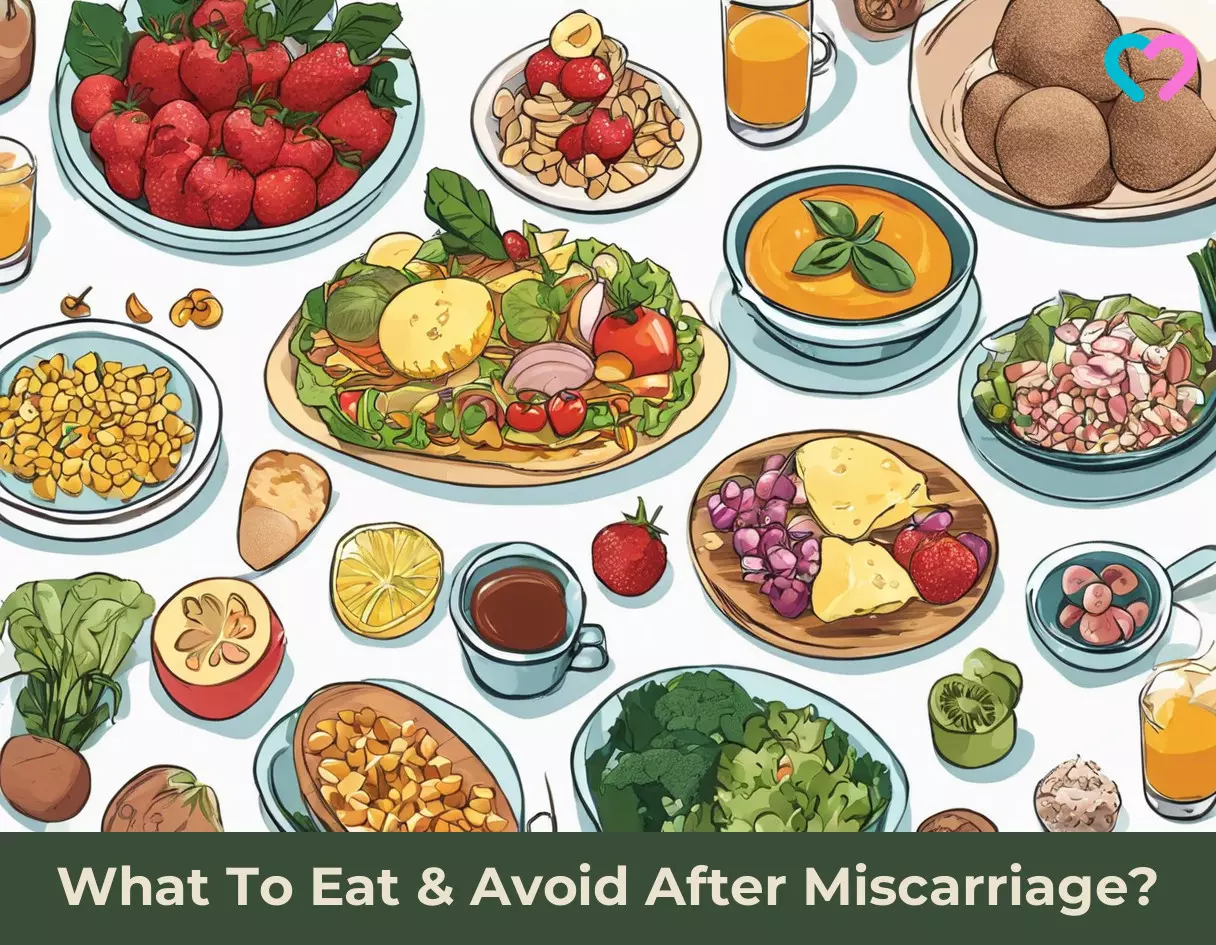
Image: Stable Diffusion/MomJunction Design Team
Personal Experience: Source
MomJunction articles include first-hand experiences to provide you with better insights through real-life narratives. Here are the sources of personal accounts referenced in this article.
i. My Miscarriage Story;https://lifeoutsideleggings.com/my-miscarriage-story/
References
- Jana L Allison et al; Management of First Trimester Pregnancy Loss Can Be Safely Moved Into the Office.
https://www.ncbi.nlm.nih.gov/pmc/articles/PMC3100102/ - Women’s Physical Health After a Miscarriage.
https://rednose.org.au/article/womens-physical-health-after-a-miscarriage - What to Eat After a Miscarriage.
https://miscarriagehopedesk.org/what-to-eat-after-a-miscarriage/#:~:text=Nutrition%20Focus%3A - Lynch, S R, and J D Cook.; (1980); Interaction of vitamin C and iron.
https://pubmed.ncbi.nlm.nih.gov/6940487/ - L D Ritchie et al; A longitudinal study of calcium homeostasis during human pregnancy and lactation and after resumption of menses.
https://pubmed.ncbi.nlm.nih.gov/9537616/ - Calcium.
https://ods.od.nih.gov/factsheets/Calcium-Consumer/#:~:text=Bone%20health%20in%20older%20adults - George A Eby and Karen L Eby; Rapid recovery from major depression using magnesium treatment.
https://pubmed.ncbi.nlm.nih.gov/16542786/ - Magnesium.
https://www.mountsinai.org/health-library/supplement/magnesium#:~:text=Dietary%20Sources - Folate.
https://ods.od.nih.gov/factsheets/Folate-HealthProfessional/ - What to Eat After a Miscarriage.
https://miscarriagehopedesk.org/what-to-eat-after-a-miscarriage/ - Understanding Carbs.
https://diabetes.org/food-nutrition/understanding-carbs - 5 Types of Foods That Cause Inflammation.
https://health.clevelandclinic.org/foods-that-can-cause-inflammation - Iron and iron deficiency.
https://www.betterhealth.vic.gov.au/health/conditionsandtreatments/iron - How alcohol affects fertility.
https://www.yourfertility.org.au/how-alcohol-affects-fertility#:~:text=Heavy%20drinking%20is%20particularly%20harmful - Durrani, Duaa, et al.; (2025); Vitamin B6: A New Approach to Lowering Anxiety, and Depression?
https://pmc.ncbi.nlm.nih.gov/articles/PMC9577631/ - Cuomo, Alessandro, et al.; (2017); Depression and Vitamin D Deficiency: Causality, Assessment, and Clinical Practice Implications.
https://www.jneuropsychiatry.org/peer-review/depression-and-vitamin-d-deficiency-causality-assessment-and-clinical-practice-implications-12051.html#:~:text=Subjects%20with%20depression%20may%20be - Fatigue.
https://my.clevelandclinic.org/health/symptoms/21206-fatigue - Preparing Your Body for Pregnancy, and Recovering from Miscarriage.
https://privatemedical.org/the-physician/preparing-your-body-for-pregnancy-and-recovering-from-miscarriage/ - Mi-Mi Zhang et.al; (2025); The efficacy and safety of omega-3 fatty acids on depressive symptoms in perinatal women: a meta-analysis of randomized placebo-controlled trials
https://pubmed.ncbi.nlm.nih.gov/32555188/ - Iron Rich Foods.
https://www.redcrossblood.org/donate-blood/blood-donation-process/before-during-after/iron-blood-donation/iron-rich-foods.html#:~:text=Iron%2DRich%20Foods&text=Heme%20iron%20is%20found%20in - T. S. Sathyanarayana Rao et al.; (2008); Understanding nutrition, depression and mental illnesses.
https://www.ncbi.nlm.nih.gov/pmc/articles/PMC2738337/ - Foods that fight inflammation.
https://www.health.harvard.edu/staying-healthy/foods-that-fight-inflammation
Community Experiences
Join the conversation and become a part of our nurturing community! Share your stories, experiences, and insights to connect with fellow parents.
Read full bio of Dr. Neha Singh
Read full bio of Ria Saha
Read full bio of Swati Patwal
Read full bio of Lorraine Teron








